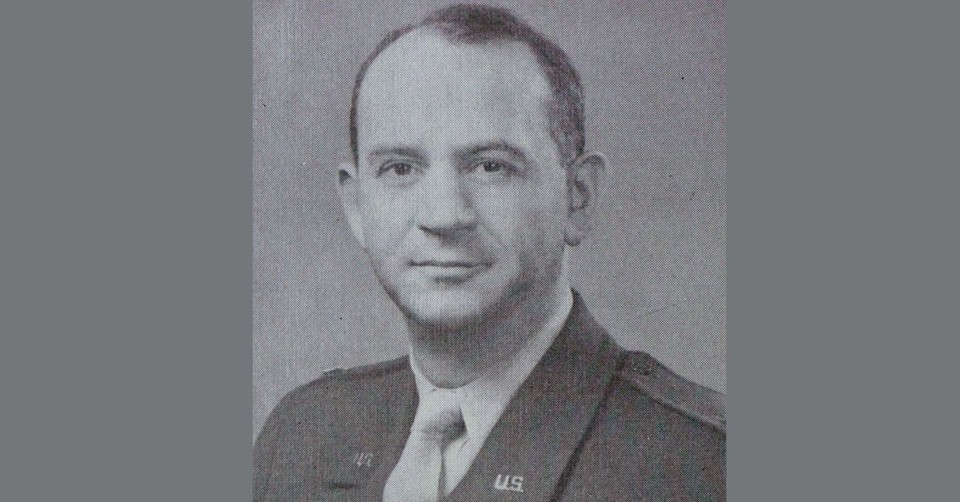Remembering and Emulating Mickey Marcus

Among the most cherished books in my library is a weathered first edition of “Cast a Giant Shadow,” the story of Col. David “Mickey” Marcus, based on which the classic 1966 film by the same name was produced, starring Kirk Douglas. After retiring from his military career following WWII, Col. Marcus was recruited in 1947 to serve as an advisor in creating the Israel Defense Forces, IDF. Marcus was among many international volunteers who flocked to Israel to provide guidance and, in fact, fight alongside Israelis in the War of Independence. These international volunteers, Jews and Christians, known by the Hebrew acronym machal, contributed greatly to Israel’s defense and victory, but not without great sacrifice.
After Israel’s May 1948 declaration of independence, Marcus became Israel’s first general. Weeks later, on June 11, Marcus was killed in a tragic friendly fire incident.
Because he was well known in the European theater fighting against the Nazis, Marcus arrived in January 1948 to the British controlled Mandatory Palestine under the name "Michael Stone,” by which time Arab armies from the surrounding countries had already begun fighting to destroy the soon-to-be declared State of Israel.
Marcus is credited with helping to design a command-and-control structure for the IDF, adapting his U.S. Army experience to Israel’s unique needs and conditions. He identified Israel's weakest points in the Negev (south), and Jerusalem area, and sought to strengthen them.
He participated in planning two operations against the British-trained Jordanian Arab Legion, which controlled the Latrun fortress. This key location strategically controlled the narrow road from Tel Aviv to Jerusalem, preventing Israeli vehicles from traveling safely along the road or to reinforce its defenses in Jerusalem. Marcus devised and supervised the creation of the legendary "Burma Road," a makeshift, unpaved, winding path through mountainous, rocky terrain. The "Burma Road" opened to vehicles on June 10, breaking the Arab siege of Jerusalem, a day before a United Nations ceasefire took effect, and the day before he was killed.
Hours before the ceasefire, Marcus returned to his headquarters in the abandoned Monastere Notre Dame de la Nouvelle Alliance in Abu Ghosh. Before dawn, 18-year-old Eliezer Linski, a new IDF soldier, challenged Marcus by asking for the password. When Marcus failed to respond with the password, Linski fired in the air at the still unidentified Marcus, who then ran towards the monastery. Linski and other soldiers opened fire, still not knowing who he was.
Shortly afterward, Marcus was found dead. It seems that because Marcus knew very little Hebrew and had responded to Linsky in English, which Linsky did not understand, Linsky failed to identify Marcus as his general. There were reports that when discovering whom he had killed, Linsky was so aggrieved that he tried to shoot himself.
Rather than being buried in the land for which he gave his life, Marcus’s body was returned to the United States for burial at West Point. His burial, with full military honors, was attended by New York Governor Thomas Dewey, former Secretary of the Treasury Henry Morgenthau, and General Maxwell Taylor, then superintendent of the United States Military Academy at West Point.
As he was so respected in America, Marcus' paratrooper helmet and pistol are displayed at the West Point Museum. His gravestone at West Point reads: "Colonel David Marcus—a Soldier for All Humanity."
Before interment, a funeral service was held at the Union Temple of Brooklyn. A memorial plaque in his memory reads:
"Killed in action in the hills of Zion while leading Israeli forces as their supreme commander in the struggle for Israel's freedom—Blessed is the match that is consumed in kindling flame/ Blessed is the flame that burns in the secret fastness of the heart/ Blessed is the heart with strength to stop its beating for honor's sake/ Blessed is the match that is consumed in kindling flame—Dedicated by his fellow members of Union Temple of Brooklyn December 9, 1949."
Sadly, Marcus and his wife Emma had no children. Israel’s first Prime Minister, David Ben-Gurion, who was Marcus’s close friend, comforted Emma, writing, "Marcus was the best man we had.”
In addition to the memorials in the United States, Mickey Marcus is a legend in Israel. His memory has been perpetuated in the names of Kibbutz Mishmar David, the Neve David neighborhood in Tel Aviv, and numerous streets named after him. One of these in Jerusalem is a tree-lined residential street in the capital’s Rechavia neighborhood, around the corner from the President’s Residence, the Jerusalem Theater, and the Theatron Hotel.
As Mickey Marcus died childless, I have always felt that we all are his children and his legacy. Today, on the anniversary of his death, it’s important to remember him and his heroism, not just dying in the country whose army he helped establish, but for standing up for western Judeo-Christian values in doing so. To Marcus, Israel’s existence was black and white.
Remembering Mickey Marcus is all the more important this year as Israel remains at war, many say still fighting modern battles in the same War of Independence for which Marcus gave his life. The war today is not limited to fighting Hamas in Gaza, Hezbollah in Lebanon, the Houthis in Yemen, other jihadis in Syria and Iraq, or their patrons in the Islamic Republic of Iran. The war is throughout the media, in hijacked public spaces, and has infiltrated Western society and its campuses, funded and masterminded by Qatar and other bad actors.
In remembering Mickey Marcus, we must affirm and emulate what he stood for and strive to fight the modern battles that still challenge Israel’s very legitimacy. It’s a hard battle, one that is more uphill than the slope of David Marcus St. in Jerusalem, but a war that can and must be won. Israel is the underdog, plagued by hate and lies from enemies on social media, and even in mainstream media. But Israel was the underdog then too, outnumbered 60:1.
Remember Mickey Marcus today, and every day, as you take the battle to the virtual frontlines that threaten us all.
Photo Courtesy: ©Getty Images/Universal History Archive/Contributor
Published Date: June 11, 2025
Jonathan Feldstein was born and educated in the U.S. and immigrated to Israel in 2004. He is married and the father of six. Throughout his life and career, he has been blessed by the calling to fellowship with Christian supporters of Israel and shares experiences of living as an Orthodox Jew in Israel. He writes regularly for a variety of prominent Christian and conservative websites and is the host of Inspiration from Zion, a popular webinar series and podcast. He can be reached at firstpersonisrael@gmail.com
Originally published June 11, 2025.







